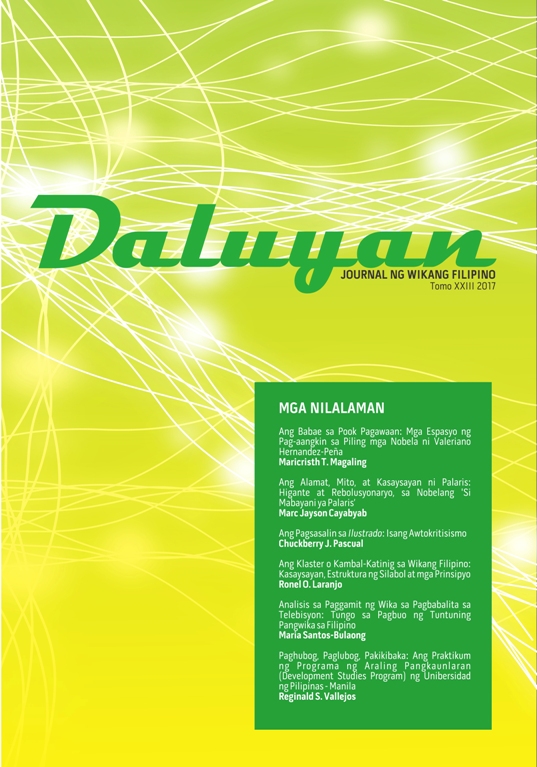Paghubog, Paglubog, Pakikibaka: Ang Praktikum ng Programa ng Araling Pangkaunlaran (Development Studies Program) ng Unibersidad ng Pilipinas Manila
Abstract
ABSTRAK
Tinatalakay ng artikulong ito ang mahigit dalawang dekada ng mga kuwento, karanasan, at aral sa pagsasagawa ng Programa ng Araling Pagkaunlaran ng Unibersidad ng Pilipinas Manila (UP Manila) ng kanilang taunang programang praktikum (Development Studies 190) kung saan mahigit apat hanggang anim na linggong nakikipamuhay ang mga mag-aaral sa kanayunan upang alamin at suriin ang kalagayan ng mga batayang sektor ng lipunan, partikular ang mga magsasaka, mangingisda, at katutubo. Ibinabahagi ng artikulong ito ang kahalagahan ng pakikipamuhay sa kanayunan upang kongkretong masuri ang lipunang Filipino at makatulong sa pagsusulong ng mga polisiya at programang pangkaunlaran na sasalamin sa buhay at pakikibaka ng mamamayan. Sa pakikipamuhay sa kanayunan, higit na nauunawaan ng mga mag-aaral ang kahalagahan ng mga teoryang natututunan sa unibersidad at kung paanong mailalapat ang mga ito sa praktika ng pagsusulong ng kaunlaran. Tinalakay rin sa artikulong ito ang mga kahinaan at ambag ng programa sa mga katuwang na organisasyon at sektor sa pagsasagawa ng praktikum. Kasama rin sa tinalakay ang kontribusyon ng programang praktikum sa pagpapaunlad ng kurikulum ng Araling Pangkaunlaran ng UP Manila.
Mga susing salita: pakikipamuhay, neoliberalismo, edukasyon, kanayunan, kaunlaran
ABSTRACT
This article discusses the stories, experiences, and lessons of almost two decades of community integration as part of the practicum program, Development Studies 190 (DS 190), of the University of the Philippines Manila (UP Manila). DS 190 requires its students to integrate with the farmers, fisherfolks, and national minorities in the countryside for four to six weeks to understand the current situations of the marginalized sectors. This article shares the importance of community integration of students to concretely analyze the Philippine society and help push for pro-poor, pro-people development policies that include the interests, aspirations and struggles of Filipinos. Throughout the course of their community integration, students develop a more precise understanding of the importance of theory and practice in advancing a genuine development for the country. For almost 20 years of community integration as practicum for Development Studies students, countless lessons and experiences have been acquired. These lessons and experiences, as well as some issues and problems are continually being used in order to further improve the practicum and make it relevant for the students, faculty, university, and the Philippine society.
Keywords: integration, neoliberalism, education, countryside, development


